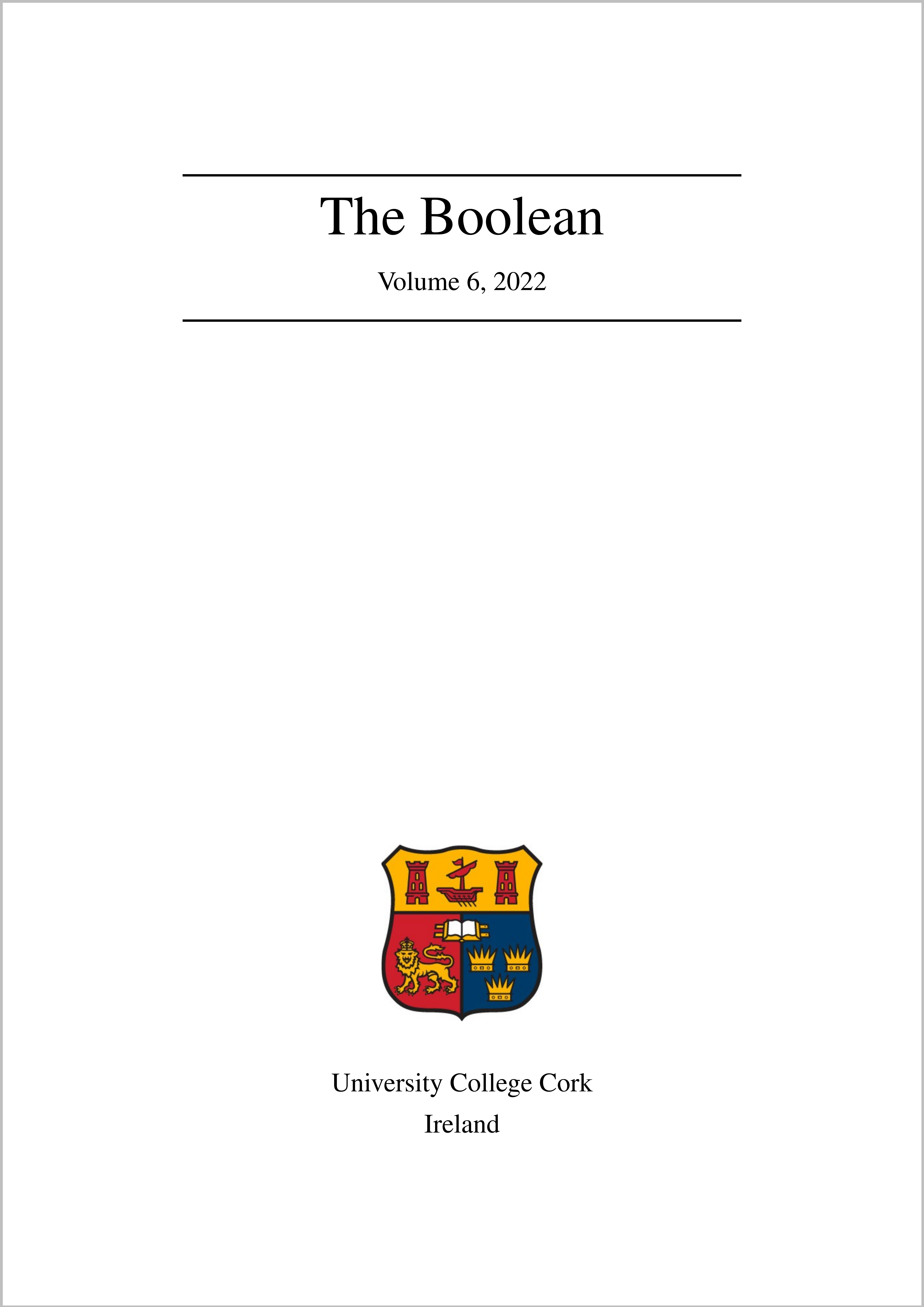Echoes from History: Women, Drug-use, and Cultural Shame
DOI:
https://doi.org/10.33178/boolean.2022.1.4Keywords:
women, shame, feminism, recovery, addictionAbstract
Women who use drugs continue to be mostly overlooked in research or are depicted as promiscuous and licentious. The legacy of a patriarchal past and moralistic societal attitudes still features heavily on the pathways to recovery for women. This project will focus on the structural barriers faced by women in accessing supports for alcohol and/or drug use. The aim is to explore the potential harm caused to women due to the structural and often patriarchal barriers they experience in accessing supports. Historically, drug treatment and policies have emerged from knowledge produced by a ‘male-based society’, for what was perceived to be, predominantly a ‘male problem’. Lorde asserts the ‘master’s tools will never dismantle the master’s house’ thus male-based knowledge production will not serve women as well as it does men. The dominant culture has valued a punitive ideology of addiction that dismisses the needs of women who use drugs and fails to address the abuses perpetrated against them. Challenging this ideology, through viewing this as a feminist and human rights issue, will be the core argument within this project.
References
S Butler and M Woods. Drugs, HIV and Ireland: responses to women in Dublin. AIDS: Women, Drugs and Social Care. Falmer Press, London, pages 51–69, 1992.
Shane Butler and Paula Mayock. ‘An Irish solution to an Irish problem’: Harm reduction and ambiguity in the drug policy of the Republic of Ireland. International Journal of Drug Policy, 16(6):415–422, 2005.
Nancy Campbell and Elizabeth Ettorre. Gendering addiction: The politics of drug treatment in a neurochemical world. Springer, 2011.
Stephanie S Covington. Women and addiction: A trauma-informed approach. Journal of psychoactive drugs, 40(sup5):377–385, 2008.
Joan Cronin. Chosen childlessness in Ireland: a qualitative study of women’s decision making, biography making and identity management. PhD thesis, University College Cork, 2019.
Jacques Derrida. Specters of Marx: The state of the debt, the work of mourning and the new international. routledge, 1994.
A. F Gordon. Some thoughts on haunting and futurity. http://www.borderlands.net.au/vol10no2 2011/gordon thoughts.pdf. Last Accessed: 2022-01-07.
Johann Hari. Chasing The Scream. Bloomsbury, 2019.
Caelainn Hogan. Republic of Shame: Stories from Ireland’s Institutions for ’Fallen Women’. Penguin UK, 2019.
Dublin: Health Research Board (HRB). Ireland Country Drug Report. Technical report, 2019.
Tom Inglis. Moral monopoly: The rise and fall of the Catholic Church in modern Ireland. Univ. College Dublin Press, 1998.
J. Ivers, F. Giulini, and G. Paul. Supporting Women to Access Appropriate Treatment (SWAAT) Study. https://www.drugsandalcohol.ie/34462/1/BLDATF TDATF SWAAT Research 2021.pdf. Last Accessed: 2021-09-25.
Patricia Kennedy. Motherhood in Ireland, Creation and Context. Mercier Press, 2004.
Hilary Klee, Marcia Jackson, and Suzan Lewis. Drug misuse and motherhood. Routledge London, 2002.
Brydie Kosmina. Feminist temporalities: memory, ghosts, and the collapse of time. Continuum, 34(6):901–913, 2020.
James Leonard and James Windle. ‘I could have went down a different path’: Talking to people who used drugs problematically and service providers about Irish drug policy alternatives. International Journal of Drug Policy, 84:102891, 2020.
A. Lorde. Sister Outsider 2nd ed. Ten Speed Press, 2007.
A. Lynch. Barriers on the pathways to safety: Addiction, structural inequality and gender disparities. Master’s thesis, University College Cork. Cork, Ireland, 2021.
Paula Mayock, Jennifer Cronly, and Michael C Clatts. The risk environment of heroin use initiation: Young women, intimate partners, and “drug relationships”. Substance use & misuse, 50(6):771–782, 2015.
R. McDonagh. Settled women talk of glass ceilings, traveller women are still outside looking through the window. https://www.irishtimes.com/life-and-style/people/settled-women-talk-of-glassceilings-traveller-women-are-still-outside-looking-through-the-window-1.4323865, 2020. Last Accessed: 2021-08-16.
Lisa Morriss. Haunted futures: The stigma of being a mother living apart from her child (ren) as a result of state-ordered court removal. The Sociological Review, 66(4):816–831, 2018.
A. Murphy. Addiction counsellors in Cork seeing first cases of women hooked on crack cocaine. https://www.echolive.ie/corknews/Addiction-counsellors-in-Cork-seeing-first-cases-ofwomen-hooked-on-crack-cocaine-65d43e11-12ad-46e8-80d5-f401bd1da1fc-ds, 2019. Last Accessed: 2020-12-03.
Feilim O’hAdhmaill. The Catholic Church and Revolution in Ireland. ´ Socialist History, 43:1–25, 2013.
Pat O’Connor. Emerging voices: Women in contemporary Irish society. Institute of Public Administration, 1998.
S. O’Mahony Carey. An exploratory study of the treatment needs of female drug and alcohol misusers. Dept. of Applied Social Studies, University College Cork. Cork, Ireland, 2009.
Andrea O’Reilly. Rocking the cradle: Thoughts on motherhood, feminism and the possibility of empowered mothering. Toronto: Demeter P, 2006.
Niamh Randall. Drug policy and rationality: An exploration of the research–policy interface in Ireland. Drugs: education, prevention and policy, 18(4):285–294, 2011.
Adrienne Rich. Of woman born: Motherhood as experience and institution. 1976. New York, 1986.
Oana Rotarescu. The experience of motherhood for five female clients in recovery from drug addiction. Social Work Review/Revista de Asistenta Sociala, 16(4), 2017.
Rosemary Rowley. Women and the constitution. Administration, 37(1):42, 1989.
Jolene Sanders. Women in narcotics anonymous: Overcoming stigma and shame. Springer, 2014.
B. Skeggs. Formations of Class and Gender. Sage Publications Ltd, 2002.
Bonnie G Smith. Women’s studies: The basics. Routledge, 2019.
Ellen Tuchman. Women and addiction: the importance of gender issues in substance abuse research. Journal of addictive diseases, 29(2):127–138, 2010.
M Van Hout. The Roma Community in Ireland. The International Journal of Diversity in Organizations, Communities, and Nations: Annual Review, 10(1):129–140, 2010.
Cornel West. Critical race theory: The key writings that formed the movement. The New Press, 1995.
M. Woods. ‘Keeping Mum’: A Qualitative Study of Women Drug Users’ Experience of Preserving Motherhood in Dublin. PhD thesis, Dublin, 2007.
Downloads
Published
Issue
Section
License
Copyright (c) 2022 Arhonda Lynch

This work is licensed under a Creative Commons Attribution-NonCommercial-NoDerivatives 4.0 International License.



